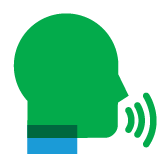When coupled with advanced analytics, communication assessments open new vistas of predictive insights that directly translate into the metrics needed to support strategic and tactical hiring decisions.
- Technology has made communication skill testing more objective, quick, scalable and accurate.
- AI and analytics have created an exceptional anti-cheating environment for remote communication tests.
- Assessments can be made more immersive with advanced industry-specific simulations.
- New assessment tools are making it possible to provide timely, interactive and retrievable feedback to the users.
Smarter tools ensure higher accuracy in evaluations
Scientific and technological advancements in communication tests have expanded their reach, making these assessments more adaptive, scalable, and accurate. These tools ensure remarkable candidate experience and support convenient remote access. Furthermore, these tools eliminate bias during the evaluation, providing higher accuracy.
Online assessment platforms help recruiters screen candidates faster with test content made by experts. These tests also streamline the evaluation process by removing the onus from manual grading. As a result, the entire process allows companies access to a larger, diversified and highly skilled talent pool.
Technology helps scale up the process of pre-employment communication assessment
The global reach of online communication assessment tests allows recruiters to dive into a larger talent pool. Recruiters can share remote English communication tests or communication test questions with candidates at the click of a mouse. With the help of cloud-based and mobile-ready assessment testing tools, they can access the test results and analyses anywhere, anytime. Here, the benefit is having the flexibility to administer and review tests wherever and whenever needed without being tied to physical paper tests or even a desktop computer.
There is greater variety and higher efficiency in general communication tests and focused English communication assessments alike
Technologically advanced communication assessment is essential for saving time and improving efficiency. When you need to test candidates for specific communication skills (e.g., writing or speaking, for industries such as advertising and BPO), assessments must accommodate several question formats, evaluation parameters and feedback options. Technology has made it possible. Such a variety and possibility make testing communication skills easier and customizable.









 Behavioral Competencies
Behavioral Competencies Cognitive Competencies
Cognitive Competencies Coding Competencies
Coding Competencies Domain Competencies
Domain Competencies



































